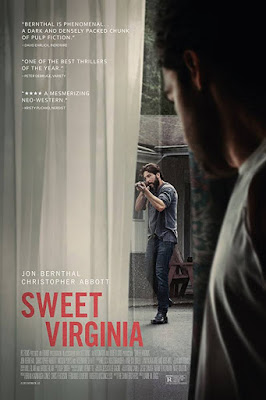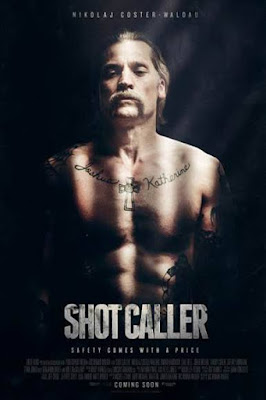Well
Dendy Newtown has come up with an initiative that’s actually welcome – unlike reclining
seats, flunkies bringing booze to your allotted place or whopper screens that
are two foot wider than the usual one and the other smacks-of-desperation
gimmicks theatre managements have been offering for a while.
They
double-featured Ric Roman Waugh’s Shot Caller and Jamie M. Dagg’s Sweet
Virginia as a nine dollar preview. These are two American regional tough stuff movies
that might have been expected to play their own local Drive-Ins before
descending into an obscure video trajectory.
With
Sweet Virginia we’ve been down this road before - think Double
Indemnity or Blood Simple, even if it does take a while for that
shape to become clear.
At
night in the small town bar and grill, the ole boys are playing Texas Hold ‘em
when swarthy Christopher Abbott comes in an asks for a meal, despite being told
the place is closed. He must take this badly because he shoots all the
gamblers, leaving young Imogene Poots (28 Weeks Later, The look of Love)
and her mature friend Alison De Witt (Faces of Tara, La La Land)
widowed.
Abbott
is soon settling in at the motel run by Jon Bernthal (Baby Driver, TV’s Punisher, Wind River’s flashback
victim) who turns out to be an ex-rodeo champ, his exploits cut eerie mute into
the title sequence. He isn’t too good at quieting down the noisy tenant but Abbott
recognises him and sets about buddying up.
There
is an unexpected plot switch revealing a scruffy, down market femme fatale, a
bit of side action with Bernthal’s teenage daughter Odessa Young and Bernthal’s
make out with De Witt. Abbott recruits a local hench man to put on masks and do
the cash packed safe before the expected blood letting. and Bernthal confronts
him with his grandfather’s service rifle. The law is conspicuously absent.
The
small scale location filming marks this as another thick ear cheapo but the atmospherically
dim ‘scope images, which will be lost on the small screen, the regional detail
and the effective performances from a cast on the edge of being name players doing
their George Stevens muted delivery, all are major assets giving this one
surprising qualities.
Shot Caller is even better. It also belongs to a
familiar line. Think Howard Hawks’ 1931, Criminal Code, Peter Yates’
1989 An Innocent Man or director ex-stuntman Ric Roman Waugh’s own
2008 Felon.
It
follows businessman Nikolaj Coster-Waldau from a nice suburban home, thrown in
the slammer when he crashes the family car while driving above the alcohol
limit. The widow of his dead passenger friend brings a civil case against him
for his home. Capital murder gets him in with all the hard cases and we see his
progress to big man in the prison system in broken sequence - made
coherent by recognising the changes in his tattoos and facial hair!
The
opening, when his release on parole is put ahead of the delays caused by a
suicide in the same forbidding cell block (“Looks like two of us are
getting out today”), has him picked up, by Bernthal again, for a party where
the naked blonde is politely turned down (“maybe later I’ll ‘phone you and we
go out for a drink”) before she is offed in a drive by shooting. Coster-Waldau
knows his black parole officer can’t place him there and the threat to throw
him back in the can for another year is a bluff.
Going
back ten years we see our hero’s attempt to tough it out in the prison yard
starting a riot where the guards mace the fighters while everyone goes to
ground. He’s taken on board by the white supremacists - at a price (“I’m not
talking about helping us with our computer skills” the glasses wearing yard
boss tells him) and smuggles balloons of dope in his but, getting pulled
further into the jail structure till, unable to avoid the CCTV cameras, he has
to shiv an opponent - much burying weapons in the loose soil. “A place like
this you get to become warriors or victims”.
The
operation is run by imposing “the Beast” Holt McCallany, who the lead meets
when they are locked in adjacent cages in the yard, and we shift into Le
Prophete. The probation officer is trying to nail McCallany who has made it
clear that “The privilege of belonging to our association doesn’t end at the
gate” with the prospect of C-W’s wife and child ending in a pool of their
own blood if he doesn’t play along. That means he has to manipulate the buy of
ex Taliban weapons at the container depot.
This
is on the way to being the most credible account of prison politics we
have. The performances and the technical work are superior. Bernthal suggests
he’s following the Charles Bronson route.
The
pair of films’ run comes after another Night Of Horror Event at the same venue –
eighteen programs of exploitation shockers similarly doomed to spend most
of their existence nowhere near the big screen. I only got to catch a couple
but they made a striking break with most of what reaches us.
In
Tom Large’s British Bodies, a small cast of un-established
performers mill around real locations as we follow young couple Lisa Ronaghan
and Joseph Baker whose home has a "For sale" sign on the lawn and
whose dog has been missing for days. They enthusiastically take up the offer of
a program with the "Kenilworth Life Science" program that offers a
pay-out that will solve their problems. In prosaic farm estate settings, they
face increasingly sinister choices where the organisers study their reactions, complete
with double exposed, echoing track interludes.
So
far so so. However as the film's real design becomes clear, it gets to be more
imposing - the running masked man missing a finger, the identical photos
numbered in a box, "What happened to my Rosie?" The argument that the
work will make easier anticipating the decisions of people in power near to
makes the craziness seem sensible.
There’s
not much visual interest in the leads eating leaves off a plate in an open
field and the film gets by without effects work (no split screen), action or
(really) sex and stays so British.
James
Bushen’s Cannibals and Carpet Fitters is also British but more
ambitious. It’s fanboy dream time with the horror home movie short they made with
their friends expanded to feature length and doing the trash festival
circuit. The small scale is finally quite endearing as the empathy the makers
feel with their material seeps through into the audience.
The
camper couple are attacked by malformed monsters in the woods (been there) and girl
survivor Jessica-Jane Stafford runs to the near-by farm house to call for help (menacing
family at table) only to be subject of the film’s one impressive special
effect.
After
the titles, we’re into the workings of Tony Nyland’s Cupid Carpets
Company where his loser staff are about to be sent off on another job at
“Some old country house in the middle of nowhere.” Guess which one? The
most competent of the Carpet fitters (stunt woman) Zara Phythian and her
romantic interest Christopher Whitlow are bickering as they lay underfelt in
the space crazy old Jenny Stokes’s (failing to channel Marjorie Main in Murder
He Says) has cleared and by the time Darren Sean Enright and Richard Lee
O'Donnell get there, we’ve already seen the carpet shears, machete and basement
trapdoor in action with Phythian’s tight sweat shirt all bloody.
If
your expectations are sufficiently low (no Sean of the Dead here despite
the team’s ambitions) this one will meet them. The effort has not gone into
characterisation, imaginative staging or an ingenious plot but into icky make
up and it just about works as we start to root for our blundering home
furnishers confronting all the sub-humans. There’s enough winning British
amateurishness backing the non-stop calamities to hold attention for the film’s
82 minutes. It could be a lot worse.
Trash
Movies have always been more interesting than art movies, closer to the needs
of their audience, more alert. Even though they near to never make it into our
festivals, multiplexes or TV airings, this new generation is a reminder
of their different aesthetic with a devoted following of its own. It’s
distant even from the zestful bad taste of Alex de Iglesia.
All
these films share a serious unpleasantness. They actually take pride in it. I don’t
know that I’d like to watch quantities of them but a quick refresher
is welcome, kind of like movie shock therapy.




No comments:
Post a Comment
Note: only a member of this blog may post a comment.